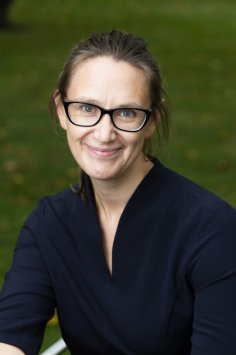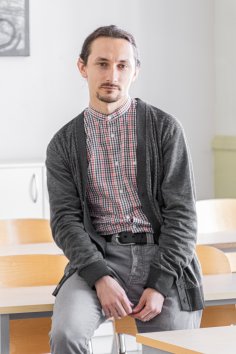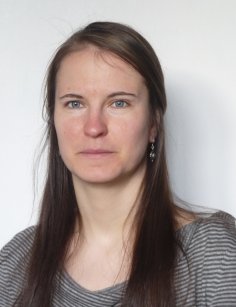Team of the UNESCO Chair
Holder of the UNESCO Chair on Applied Studies of Intangible Cultural Heritage
Professor of Cultural Studies, Ph.D.
The research of Professor Kristin Kuutma focuses on heritage policies and the links between cultural heritage and identity. She has also been actively involved in implementing the Convention for the Safeguarding of the Intangible Cultural Heritage on the international level – as an expert representing Estonia in the Intergovernmental Committee for the Safeguarding of the Intangible Cultural Heritage, participating at numerous expert meetings, and serving the UNESCO secretariat in an advisory capacity. At the national level, she is the Chairman of the Council of the Estonian National Commission for UNESCO and a member of the Estonian Council for Intangible Cultural Heritage.
Estonian Research Information System
Masters & Ph.D. Supervision (choice)
- Caroline Haubold „The Role of Song Celebrations and Choral Societies in the Formation and Manifestation of the Baltic German Identity." Ph.D., under supervision
- Siarhiej Makarevič "Living Heritage as a Resource for Sustainable Livelihoods." Ph.D., under supervision
- Savannah Rivka Powell „Songs Carried by Ancestors and Hidden in Archives: The Politics of Minority Identities, Gender, and UNESCO Status for the Seto of Estonia and the Ainu of Japan.” Ph.D., under supervision
- Alena Shisheliakina, Ph.D. (2022) “Being a woman and being Tatar: intersectional perspectives on identity and tradition in the post-soviet context.”
- Triinu Arak, MA (2020) "Inventory of the Choral Landscape in Tartu, Estonia in the Years 2017-2019". (In Estonian)
- Siarhiej Makarevič, MA (2022) „Revitalisation of Local Weaving Tradition in Hancavicy District (Belarus).“
- Mare Mätas, MA, about Kihnu cultural heritage, under supervision
- Katarina Stradner, MA (2021) „Creating a Representation: The Singing to the Accompaniment of the Gusle as a Nomination to the UNESCO Representative List of Intangible Cultural Heritage.“
Recent publications (choice):
Kuutma, Kristin 2024. Ownership and rights: sustainable development ideals with inequalities of recognition and resource management. - At the Crossroads: Intangible Cultural Heritage and Sustainable Development, Chiara Bortolotto and Ahmed Skounti (Eds.). London: Routledge, 73-88.
Kuutma, Kristin; Vaivade, Anita 2021. Political Imperatives in the Heritage Regime and the Emergent Collaborative Scenarios on the Ground: Case Studies from the Baltics. -Slovenský národopis/Slovak Ethnology, Vol 69, No 4, 519-533.
Kuutma, Kristin; Annist, Aet 2020. Home and Heritage out of Place: The Disjunction of Exile. - International Journal of Heritage Studies, Vol 26, 10, 942-954.
Kuutma, Kristin 2019. Conclusion: The Politics of Scale for Intangible Cultural Heritage - Identification, Ownership, and Representation. - Tuuli Lähdesmäki, Suzie Thomas, Yujie Zhu (Eds). Politics of Scale: New Directions in Critical Heritage Studies. New York-Oxford: Berghahn, 156-170.
Kuutma, Kristin 2019. Inside the UNESCO Apparatus: from Intangible Representations to Tangible Effects. - Natsuko Akagawa, Laurajane Smith (Eds). Intangible Heritage: the practices and politics of safeguarding. Routledge, Taylor&Francis Group, 68-83.

Associate Professor of Ethnology, Ph.D.
aet.annist@ut.ee
At the analytical center of Aet Annist's attention is developing the concept of dispossession in its different forms (social, symbolic, ethnic dispossession, and dispossession of the future) as well as the new class relations emerging from this setting, as a continuation of dispossession or in reaction to this. In such processes, the institutionalization of heritage culture bears a crucial role in peripheral regions - a theme she has addressed within the IRG project led by the UNESCO Chairholder Kristin Kuutma and within the Horizon2020 project PROMISE, led by Manchester University. Aet Annist's current research interests encompass the theme of climate socialities and links between forest protests and heritage culture.
She has contributed regularly to Estonian media, to applied research for Estonian ministries and Parliament as a consultant, to art exhibitions as a writer, and as an activist, consultant, and facilitator to the activities of Estonian and British protest groups.
Estonian Research Information System
Masters & Ph.D. Supervision (choice)
- Daina Pupkevičiūtė „Relationships as permaculture in the context of climate change: care and support practices in the Lithuanian countryside.“ Ph.D., under supervision
- Bianka Plüschke-Altof, Ph.D. (2017) „Images of the Periphery Impeding Rural Development? Discursive Peripheralization of Rural Areas in Post-Socialist Estonia“. Co-supervisor Andres Kuusik
- Mirjam Rennit, MA (2022) „ Estonian Fridays For Future and Extinction Rebellion: groups and activists." In Estonian
- Ann Aaresild, MA (2020) "I Don’t Think Newspapers Influenced Us”: The Role of Media and Its Changes in Estonian Expatriate Communities in Canada and the U.S. from the Beginning of the Cold War until Today.". In Estonian, Tallinn University
- Ede Schank-Tamkivi, MA (2019) „Eesti by the Bay: Transnationalism/long distance nationalism in the Estonian diaspora.“ Tallinn University
Recent publications (choice):
Annist, Aet 2020. Introduction: Performance, Power, Exclusion, and Expansion in Anthropological Accounts of Protests. - Conflict and Society, Vol 6 (1), 183-200.
Kuutma, Kristin; Annist, Aet 2020. Home and Heritage out of Place: The Disjunction of Exile. - International Journal of Heritage Studies, Vol 26, 10, 942-954.
Plüschke-Altof, Bianka; Annist, Aet 2021. Populism of the Dispossessed: Rethinking the Link between Rural Authenticity and Populism in the Context of Neoliberal Regional Governance. - Pavel Pospech, Eirik Magnus Fuglestad, Elizabete Figueiredo (Ed). Politics and Policies of Rural Authenticity. Routledge, 42−59.
Pilkington, Hilary; Acik, Necla; Annist, Aet; Chorvat, Ivan; Dähnke, Iris; Nartova, Nadia; Shilova, Anastasia and Yasaveyev, Iskender 2021. Positive marginality? Young people’s activism and the paradoxes of recognition politics. - Journal of Youth Studies.
Annist, Aet 2022. Post-socialism as an experience of distancing and dispossession in rural and transnational Estonia. - Critique of Anthropology, 42 (2), 137−153.

Associate Professor of Estonian and Comparative Folklore, Ph.D.
Deputy Head for Doctoral Studies at the Institute of Cultural Research
Elo-Hanna Seljamaa researches ethnicity, nationalism, and integration in Estonia and is fascinated by living with difference as it is experienced in daily life and institutionalized in policies. She is consequently interested in processes of heritagisation and inclusions, exclusions and interventions by means of heritage management.
As a folklorist, she is drawn to traditions that do not fit easily into UNESCO’s formulation of intangible cultural heritage. Her research project (2018-2021), a start-up grant funded by the Estonian Research Council, explored these topics through the lens of belonging and non-belonging.
As an educator, she is intrigued by the genre of Master’s thesis that invites students to apply in practice the theoretical knowledge acquired during their studies and to learn new skills.
Elo-Hanna Seljamaa frequently collaborates with the Estonian Folk Culture Centre. She has curated art exhibitions and explored the use of ethnographic methods in the study of culture and artistic research.
Estonian Research Information System
Masters & Ph.D. Supervision (choice)
- Christiana Holsapple Ph.D. (2022) “Narratives of positionality in contemporary Gagauzia: complexity and national normativity”
- Digne Ūdre „Visually interpreted ideologies: ornament as contested cultural heritage in contemporary Latvia.“ Ph.D., under supervision
- Chahal Garg, MA (2023) "CRAFTECH FUTURES: Speculative Futures of Craft and Technology Convergence".
- Sohail Arshad, MA (2022) „Biradari System: A Dominating Factor in the Politics of Punjab Province.“
- Lily Jane Gartland, MA (2021)„The Ghostlore Podcast: The Tangible in the Intangible.“ Co-supervisor Ülo Valk
- Paulina Vituščanka, MA (2020) „Vernacular Belarusian Writing in the Eastern Provinces of the Second Polish Republic: a Case Study of Narratives from the Lithuanian Central State Archives 368.1.22 and 368.1.49“. Co-supervisor Katre Kikas
- Yuliya Len, MA (2019) „Jewish Community of Berdychiv and the Early Soviet Policie.“
- Mohammad Abu Sayed Toyon, MA (2019) „Opportunities and Challenges in Promoting Culture: Empirical Study on Cultural Institutions of Tartu.“
- Michele Tita, MA (2019) „Tarantism: from An Ancient Syndrome to a New Form of Heritage in Southern Italy.“ Co-supervisor Ülo Valk
- Lisandra Roosioja, MA (2018) „An Ethnographic Exploration of the Phenomenon behind the International Success of Ethno.” Estonian Academy of Music and Theatre
Recent publications (choice):
Harro-Loit, Halliki; Vihalemm, Triin; Jõesalu, Kirsti; Seljamaa, Elo-Hanna 2020. Mapping celebration practices in Estonia: which days of importance actually influence societal rhythms? - Anu Kannike, Katre Pärn, Monika Tasa (toim). - Interdisciplinary Approaches to Culture Theory. Tartu: Tartu University Press, 248−328.
Seljamaa, Elo-Hanna 2021. Diversities claimed, displayed and silenced: Encounters at the new Estonian National Museum. - Ethnologia Europaea, 51 (1), 72−98.
Seljamaa, Elo-Hanna 2022. Kuulub – ei kuulu. Kuulumise, konviviaalsuse ja autohtoonsuse mõistetest [Belonging – Non-belonging: On the Concepts of Belonging, Conviviality and Autochthony]. – Keel ja Kirjandus, 5, 404−422.

Junior Research Fellow in Ethnology, MA
Siarhiej Makarevich focuses on applied research of intangible cultural heritage (ICH) with a particular interest in traditional craftsmanship. As a cum laude graduate of the “Folkloristics and Applied Heritage Studies” MA programme at the University of Tartu, he gained a solid understanding of the international ICH framework and its application in local contexts in the example of Belarus. At present, he is widening his research area to the Baltic region and shifting its focus to explore the intersection of living heritage and sustainable development.
His academic interest in living heritage developed from his practical experience as a craftsman as well as diverse work experience as a junior research fellow in the local crafts centre in Belarus, intern in the open-air museum in Germany, a participant in volunteering projects on different heritage sights and several social initiatives related to folk culture.

UNESCO Cooperation Specialist, MA
kristiina.porila@ut.ee
Kristiina Porila got her Master’s degree from the University of Kiel (Germany), where she studied ethnology (Europäische Ethnologie/Volkskunde).
Before working for the UNESCO Chair, she was involved in implementing the UNESCO Convention for the Safeguarding of Intangible Cultural Heritage in Estonia, working at the Estonian Folk Culture Centre.
She also has experience working with the Convention on the international level – e.g., evaluating nomination files for UNESCO’s global lists of intangible heritage (in the Subsidiary and Consultative Bodies) and representing Estonia at international meetings.
At the UNESCO Chair Kristiina Porila takes care of the communication and administrative tasks. She has organised research seminars and is in charge od the course on Intangible Cultural Heritage.
Research Assistant, MA
Maarja Veisson studied Ethnology in Tartu and Helsinki. She has previously worked as a translator.
At the UNESCO Chair she works with the RISE UP project, that is about revitalising languages and safeguarding cultural diversity.


